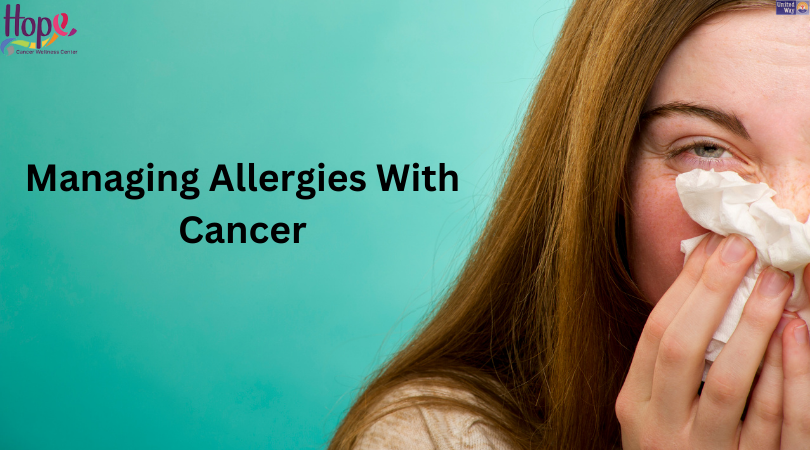
Managing Allergies with Cancer: Tips for Navigating Treatment and Seasonal Sensitivities
Cancer treatment often involves a series of physical and emotional challenges. Between dealing with side effects like fatigue, nausea, and pain, managing allergies can add an extra layer of complexity. For many cancer patients, allergies may worsen during treatment or be harder to manage due to weakened immune systems. Whether it’s pollen in the air or a food sensitivity, managing allergies with cancer requires thoughtful planning and care.
In this post, we’ll explore how cancer treatment can affect allergies, share tips for managing common allergens, and discuss strategies for improving quality of life during this challenging time.
How Cancer Treatment Affects Allergies
Cancer treatments such as chemotherapy, radiation, and immunotherapy weaken the immune system, which can lead to more frequent or intense allergic reactions. Additionally, treatments may cause changes in the body that make it more susceptible to certain allergens. For instance:
- Chemotherapy can cause a reduction in white blood cells, which are essential for fighting infections. This can lead to increased sensitivity to allergens, making reactions more severe.
- Radiation therapy can impact areas of the body such as the throat and sinuses, making it more difficult for patients to manage symptoms like nasal congestion or respiratory issues.
- Immunotherapy works by boosting the immune system to fight cancer, but it may also make the body more reactive to allergens.
For many cancer patients, dealing with allergies on top of cancer symptoms can be particularly overwhelming. However, with the right strategies, it’s possible to manage allergies effectively and make life a little more comfortable.
Common Allergies and How to Manage Them During Cancer Treatment
1. Seasonal Allergies (Pollen)
Seasonal allergies are a common issue for many people, especially in spring and fall when pollen counts are at their highest. For cancer patients, exposure to pollen can exacerbate symptoms like sneezing, runny nose, and itchy eyes. Here are some tips for managing seasonal allergies:
- Stay indoors during peak pollen times: Pollen levels are usually highest in the morning and on windy days. If possible, limit outdoor activities during these times.
- Use air purifiers: High-efficiency particulate air (HEPA) filters can trap pollen and other allergens, improving the air quality indoors.
- Shower after being outside: Washing off pollen from your hair, skin, and clothes can help reduce its impact on your body.
- Consult your doctor about antihistamines: Certain allergy medications, such as antihistamines, may still be safe for cancer patients, but it’s essential to ask your healthcare team for recommendations specific to your treatment.
2. Food Allergies
Food allergies are another common issue for cancer patients, especially for those who are undergoing chemotherapy or immunotherapy. Treatment can affect the digestive system, making food allergies more challenging to manage. To reduce the risk of an allergic reaction:
- Talk to a nutritionist: A nutritionist who specializes in oncology care can help create a safe, balanced diet that avoids allergens while meeting your nutritional needs.
- Avoid cross-contamination: For those with food allergies, it’s important to avoid any contact between allergenic foods and safe foods to prevent reactions.
- Read labels carefully: Always check food labels for potential allergens, especially in packaged or processed foods.
- Monitor symptoms closely: Keep track of any allergic reactions to certain foods and share this information with your healthcare provider.
3. Environmental Allergies (Dust, Mold, Pet Dander)
Environmental allergens such as dust, mold, and pet dander can trigger respiratory symptoms like coughing, wheezing, or congestion, which can be harder to manage for cancer patients. Here’s how you can reduce exposure to environmental allergens:
- Clean and dust regularly: Regular cleaning can help reduce dust and pet dander buildup. Consider using a vacuum with a HEPA filter.
- Control indoor humidity: Use dehumidifiers to prevent mold growth, especially in damp areas like bathrooms and basements.
- Limit exposure to pets: If pet dander is an allergen, it may help to limit direct contact with pets or designate pet-free areas in your home.
- Use hypoallergenic bedding: Consider using dust-mite-proof covers for pillows and mattresses to reduce exposure to dust mites.
4. Drug Allergies and Sensitivities
In addition to environmental and food allergies, cancer patients may develop sensitivities or allergic reactions to certain medications used during treatment. It’s important to be aware of any changes in your body after receiving treatment. If you notice symptoms like a rash, swelling, or difficulty breathing after taking a medication, seek medical advice immediately.
- Inform your doctor: Always inform your oncologist or healthcare provider about any drug allergies or sensitivities you have before starting treatment.
- Carry an allergy card: If you have a known allergy to certain medications, keep a card with you that lists the drugs you need to avoid.
Strategies for Boosting Immunity and Reducing Allergy Symptoms
Managing allergies with cancer treatment can be challenging, but there are additional ways to help reduce symptoms and improve your overall well-being:
- Stay hydrated: Drinking plenty of fluids can help clear out allergens and keep mucus membranes moist.
- Eat a nutrient-rich diet: Proper nutrition can support a strong immune system, even while undergoing cancer treatment. Include antioxidant-rich foods like berries, leafy greens, and nuts in your diet.
- Practice stress reduction: Stress can make allergy symptoms worse, so it’s important to find ways to relax. Meditation, deep breathing exercises, and yoga can be helpful for reducing stress and managing symptoms.
When to Seek Help
If your allergy symptoms worsen or interfere with your cancer treatment, it’s important to consult your healthcare provider. They may recommend changes to your treatment plan or prescribe medications to help manage symptoms. Additionally, an allergy specialist (immunologist) may be consulted for more complex cases.
Conclusion
Living with cancer is already a complex journey, and managing allergies can add extra challenges. However, with proactive care, the right treatments, and open communication with your healthcare team, you can successfully manage allergies and make your cancer treatment experience more comfortable. Whether it’s seasonal allergies, food sensitivities, or environmental triggers, understanding how to navigate them will help you maintain your health and quality of life during this challenging time.
